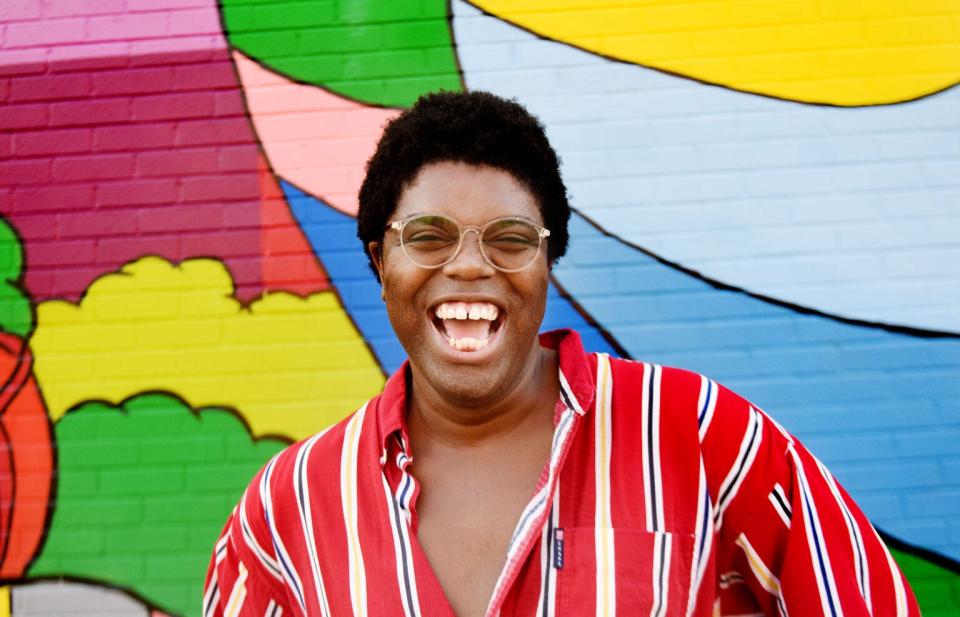Why members of LGBTQ community in Louisiana want more support than they had growing up
For Steven Knight, growing up Black, queer and Christian in Shreveport meant facing resistance toward who he was from conflicting parts of his community.
His church told him gay people are going to go to hell. Black culture told him “being gay is a white thing,” he said. The media’s representation of masculinity in his community told him that a man was “this bravado, chest-puffed, tough guy who doesn’t cry.”
“For a long time, I struggled with defining what masculinity meant for myself,” Knight said.
Growing up queer in Louisiana is a vastly different experience depending on location, according to SarahJane Guidry, executive director of Forum for Equality, an umbrella LGBTQ group in Louisiana. The comfort level for someone who identifies as LGBTQ at a young age depends on visibility, Guidry said. People growing up queer need to see representation in their community to feel like they belong.

“There’s going to be differences” between how urban and rural communities treat LGBTQ people in the midst, she said.
Read this: She was sexually assaulted within months of coming out. She isn't alone.
'Astounding,' 'cruel': State lawmaker proposes ban on transgender health care for minors
New Orleans, for example, has many gay and gay-friendly bars as well as celebrations and parades throughout Pride Month, giving lots of prominence to its LGBTQ community.
In smaller, more rural areas of the state, queer people typically have less visibility, so queer youth tend to feel less accepted for who they are, Guidry said, adding that it can vary from town to town.
In most small communities, there is a “love the sinner, hate the sin” mentality toward queer youth, leaving them without the support “to feel that even what they’re feeling is right and comfortable,” Guidry said.
This isolation can stand in the way of someone fulfilling what they considered to be their true identity.
Elliot Wade, who is transgender and a Cecilia native, said that he didn’t know gender reassignment was even a possibility until he was a teenager. Wade is taking part in a Forum for Equality campaign to provide hope and encouragement to young LGBTQ+ people ni Louisianans.
“I had no examples. … Transitioning was something I never thought was an option,” Wade said in a video for the campaign. As a teenager, he realized “that my gender identity (was) not aligning with what I was assigned at birth.”
Wade said his parents had to relearn old notions of gender identity when he came out to them. His mother was concerned because of the violence and harassment she saw directed toward transgender people.
“I was ready for that. Whatever comes my way, it’s better than living a lie,” Wade said. “That was the beginning of me not giving a f—, and it was liberating.”
Knight said he learned a similar lesson and came to realize his own definition of what it means to be a man.
“Being masculine and being a man, it’s just about being a good person and being dependable and those are characteristics that aren’t even gender specific,” he said.
Knight came out as queer right before going to Centenary College in Shreveport, where he said, “I never once had a bad experience with anybody.”
“I had a sort of confidence and adamant nature about me (after coming out) where I was like, ‘I’m not letting anybody screw with me. I have spent all my life waiting for this moment, and I dare anybody to try to make me feel less than,’” he said.
Knight rode that confidence coming out of college and was determined to use it to positively change his community.
“As a young person in Louisiana, in the South in general, it’s my duty to be aware of what’s going on in my community civically, socially,” he said. “And be able to decipher policy and law and advocate for people who may not be there yet.”
Knight co-founded an organization in Shreveport called ShrevePride, which was started as a safe place for LGBTQ and straight people to interact and have fun doing Pride events within the community. ShrevePride has grown exponentially since its founding and still hosts yearly Pride events like dances and field days.
“I wanted more from my community than what was presented to me, so I knew that I had to do something,” he said.
Knight is now president of People Acting for Equality and Change, a group promoting equality for LGBTQ residents in northwest Louisiana.
From 2021: Free support group now available for trans adults and youths in Houma-Thibodaux
Hurricane Ida: Saturday Ida relief aid distribution focused on LGBTQ+ community members
“What folks don’t realize is that there are really large groups of progressive, open-minded people across this state,” he said, “to receive them and to advocate and fight on their behalf. Shreveport is a city that is ready to do that.”
Schools in Shreveport are also opening up more gay-straight alliances to provide resources for queer youth in the city, Knight said.
“There are quite a few affirming churches in this area to do a lot of reconciliation management. Our civic leaders are pretty dope, but everyone can always do more,” he said.
Guidry said people can start by educating themselves on LGBTQ issues and having conversations with community members.
“The most impactful thing that people can do, especially for (queer) youth, is really learning how to be an advocate and an ally,” Guidry said.
— The Louisiana Illuminator is an independent, nonprofit, nonpartisan news organization driven by its mission to cast light on how decisions are made in Baton Rouge and how they affect the lives of everyday Louisianians.
This article originally appeared on The Courier: LGBTQ residents speak on experiences growing up in Louisiana

